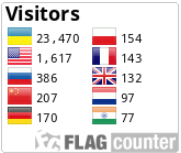METHODOLOGICAL SUPPORT OF INTERCULTURAL COMMUNICATION OF STUDENTS IN ENGLISH LESSONS
DOI:
https://doi.org/10.28925/2518-7635.2022.75Keywords:
English lessons, international communication, method, methodological support, school studentsAbstract
The article is devoted to the methodological support for the formation of intercultural communication of school students in English lessons. The aim of the article is to describe the methodological support which can be used to form the intercultural communication of school students at the English lessons. Analysis and systematization of the methods for the formation of intercultural communication of school students at the English lessons were chosen as the leading methods. The author mentions that in the era of globalization and digital society the development of science, technology and pace of people’s life is constantly accelerating. Thus, nowadays, one of the most necessary skills of a modern person is his or her readiness for the intercultural communication, which supposes his or her ability to communicate with the representatives of different cultures and to achieve the desired result – mutual understanding. It is pointed out that the secondary school has to form the readiness for intercultural communication since adolescence. This age is sensitive to the formation of moral and cultural qualities of personality, character, attitudes, stereotypes of behaviour thinking, world-view which provides an opportunity to instil national and universal human values in teenagers, to cultivate a respectful attitude towards another culture. Also, the most favourable environment for acquiring and learning international communication skills is the English lesson. It is almost impossible to communicate with the representatives of other cultures without knowing English. It is defined that the effective methodological support for the formation of intercultural communication of school students at the English lessons depends on the correct usage, combination and sequence of methods, techniques and means. Different methods of forming intercultural communication of school students at the English lessons are given: verbal narrative, clarification, discussion, lecture, illustration method, displaying, dramatization method, dialogic teaching and technologies, simulations and interactive simulation methods, methods of biographic reflection, role plays, method of projects, WebQuests, training method.
Downloads
References
Bowman, C. (2000). Infusing technology-based instructional frameworks in the methods courses: a response to Pope and Golub. Contemporary Issues in Technology and Teacher Education, 1(1), 98–101.
Dodge, B. (1997). Some thoughts about WebQuests. San Diego State University. http://webquest.sdsu.edu/about_webquests.html
Hoidosh, N. (2012). Dialohovi tekhnolohii navchannia u systemi profesiinoi pidhotovky maibutnikh uchyteliv inozemnykh mov [Dialogue technologies of teaching in the system of professional training of future foreign language teachers]. Pedagogy. Psychology. Philosophy. Pereiaslav-Khmelnytskyi, 26, 70–75.
Holota, N. (2022). Dialohichni tekhnolohii yak skladova praktyko zoriientovanoi pidhotovky maibutnikh pedahohiv. Pedagogical Education: Theory and Practice. Psychology. Pedagogy, 37(1), 47-53. https://doi.org/10.28925/2311-2409.2022.377
Liddicoat, A. J. (2022). Interculturality in language and culture education. Language
Education in Multilingual Colombia. (pp. 5-16). Routledge. https://doi.org/10.4324/9781003155263
Littlewood, W. (1991). Communicative Language Teaching. Cambridge University Press.
Liu, Y. (2022). Developing Students’ Intercultural Communicative Competence Through Threads of Personal Experiences: A Reflective Approach, Chinese Journal of Applied Linguistics,45(3), 433–444. https://doi.org/10.1515/CJAL-2022-0309
Mospan, N. (2022). Teaching emotional English intonation. Continuing Professional Education: Theory and Practice, 2, 45–51. https://doi.org/10.28925/1609-8595.2022.2.5
Mospan, N. V., Ognevyuk, V. O., & Sysoieva, S. S. (2022). Emergency higher education digital transformation: Ukraine’s response to the COVID-19 pandemic. Information Technologies and Learning Tools, 89(3), 90–104. https://doi.org/10.33407/itlt.v89i3.4827
Mospan, N. V., & Sysoieva, S. O. (2022). Trends in digital adaptation of schools during the COVID-19 pandemic. Information Technologies and Learning Tools, 91(5), 21–35. https://doi.org/10.33407/itlt.v91i5.5063
Minett, A. J., Dietrich, S. E., & Ekici, D. (2022). Person to Person Peacebuilding, Intercultural Communication and English Language Teaching: Voices from the Virtual Intercultural Borderlands. (pp. 1–195). Multilingual Matters.https://www.multilingual-matters.com/page/detail/Person-to-Person-Peacebuilding-Intercultural-Communication-and-English-Language-Teaching/?k=9781788927079
Pidborskyi, Yu. (2012). Zastosuvannia dialohovykh tekhnolohii u navchalno-vykhovnomu protsesi [Using of dialogue technologies in the educational process]. Pedagogical Sciences: Collection of scientific works, Luhansk, 22 (257), 132–139.
Salomão, A. C. (2022). Foreign Language Communication in Virtual Exchanges: Reflections and Implications for Applied Linguistics. International Journal of Computer-Assisted Language Learning and Teaching (IJCALLT), 12(3), 1–14. http://doi.org/10.4018/IJCALLT.307061
Simpson, A. (2022). Reconfiguring Intercultural Communication Education through the dialogical relationship of Istina (Truth) and Pravda (Truth in Justice). Educational Philosophy and Theory. https://doi.org/10.1080/00131857.2022.2098109
Tamarkina, O. (2016). Zastosuvannia dialohovykh tekhnolohii v navchalnomu protsesi. Problems of linguistics and methodology of teaching languages in the context of entry of Ukraine into the European space: collection of materials of All-Ukrainian Internet Conference. UNUS.
Villegas-Paredes, G., Canto, S., & Moranta, I. R. (2022). Telecollaboration and intercultural communicative competence in SFL teaching-learning: a Project in Higher Education [Telecolaboración y competencia comunicativa intercultural en la enseñanza-aprendizaje de ELE: un proyecto en Educación Superior] (pp. 97–118). https://dialnet.unirioja.es/servlet/articulo?codigo=8393671
Wang, M., & Devitt, A. (2022). A systematic review of computer-mediated communications in Chinese as a foreign language from 2008 to 2022: Research contexts, theoretical foundations and methodology, affordances and limitations. Language Teaching Research, 0(0). https://doi.org/10.1177/13621688221132475
Published
How to Cite
Issue
Section
License
Copyright (c) 2023 The Modern Higher Education Review

This work is licensed under a Creative Commons Attribution-NonCommercial 4.0 International License.













